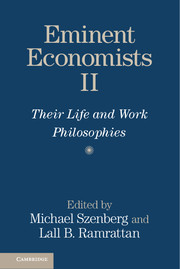Book contents
- Frontmatter
- Dedication
- Contents
- List of Contributors
- Foreword
- Preface and Acknowledgments
- Introduction
- 1 Being There: An Intellectual Journey
- 2 Social Norms in Economics and in the Economics Profession
- 3 Personal Reflections on My Professional Life
- 4 Gray Eminence?
- 5 Biochemist to Economist
- 6 Puzzles and Paradoxes: A Life in Applied Economics
- 7 Succeeding in Economics
- 8 My Research Strategy
- 9 My Philosophy of Economics, Life, and Everything (Not!)
- 10 Finding a Niche
- 11 Become an Economist – See the World
- 12 Practitioner of the Dismal Science? Who, Me? Couldn’t Be!!
- 13 One Job, Four Careers
- 14 My Life and Research Strategy
- 15 How I Ended Up Being a Multifaceted Economist and the Mentors I Have Had
- 16 Searching for My Personal Philosophy
- 17 Learning about the Evolving International Economy
- 18 Confessions of a Wellesley FEM
- 19 God, Ants, and Thomas Bayes
- 20 The Path of a Monetary Economist
- 21 Learning from the Field
- 22 Order in and through Disorder: The Invisible Hand as a Turbulent Regulator
- 23 The Education of an Economist
- 24 Faith, Science, and Religion
- 25 My Studies in International Economics
- 26 Sailing into the Wind
- 27 My Life and Work Philosophy
- 28 Scaling Fortress Economics
- 29 The Accidental Economist
- Index
- References
10 - Finding a Niche
Published online by Cambridge University Press: 05 June 2014
- Frontmatter
- Dedication
- Contents
- List of Contributors
- Foreword
- Preface and Acknowledgments
- Introduction
- 1 Being There: An Intellectual Journey
- 2 Social Norms in Economics and in the Economics Profession
- 3 Personal Reflections on My Professional Life
- 4 Gray Eminence?
- 5 Biochemist to Economist
- 6 Puzzles and Paradoxes: A Life in Applied Economics
- 7 Succeeding in Economics
- 8 My Research Strategy
- 9 My Philosophy of Economics, Life, and Everything (Not!)
- 10 Finding a Niche
- 11 Become an Economist – See the World
- 12 Practitioner of the Dismal Science? Who, Me? Couldn’t Be!!
- 13 One Job, Four Careers
- 14 My Life and Research Strategy
- 15 How I Ended Up Being a Multifaceted Economist and the Mentors I Have Had
- 16 Searching for My Personal Philosophy
- 17 Learning about the Evolving International Economy
- 18 Confessions of a Wellesley FEM
- 19 God, Ants, and Thomas Bayes
- 20 The Path of a Monetary Economist
- 21 Learning from the Field
- 22 Order in and through Disorder: The Invisible Hand as a Turbulent Regulator
- 23 The Education of an Economist
- 24 Faith, Science, and Religion
- 25 My Studies in International Economics
- 26 Sailing into the Wind
- 27 My Life and Work Philosophy
- 28 Scaling Fortress Economics
- 29 The Accidental Economist
- Index
- References
Summary
Becoming a professor was easier than becoming an economist. Growing up in Berkeley I was surrounded by professors; they dominated my parents’ dinner parties, though my mother and father themselves were not academics. The conversation touched on book projects, sabbatical plans, and foreign travel. There was the security of a regular paycheck but, so it seemed, no one resembling a boss.
Growing up in Berkeley had its distinctive aspects. An outing for the socially conscious among my high school classmates was going down to the university and getting tear-gassed. At about this time the high school curriculum compelled one to choose between the natural sciences, social sciences, and humanities tracks. Social sciences were irresistible for someone growing up in this political petri dish. The natural sciences track, in contrast, would have meant more math. Early decisions have long-term consequences.
The University of California, Santa Cruz, where I was an undergraduate, was another child of the 1960s. Intended as an alternative to factory schools like Berkeley, it had no grades, few major and breadth requirements, and little intellectual structure. Students were encouraged to design their own majors. This encouraged healthy disrespect for conventional academic boundaries, something that comes in handy for an economic historian. Santa Cruz also sent me for my junior year to the University of St. Andrews. St. Andrews students met periodically with a tutor to discuss assignments and read papers. My tutor was the Spanish economic historian Geoffrey Parker. In my senior year back at Santa Cruz, the department hired as a visitor a brilliant graduate student from Stanford, Flora Gill, to teach a course in economic history.
- Type
- Chapter
- Information
- Eminent Economists IITheir Life and Work Philosophies, pp. 129 - 144Publisher: Cambridge University PressPrint publication year: 2014

